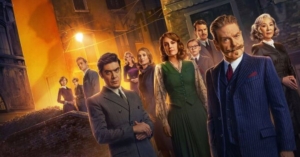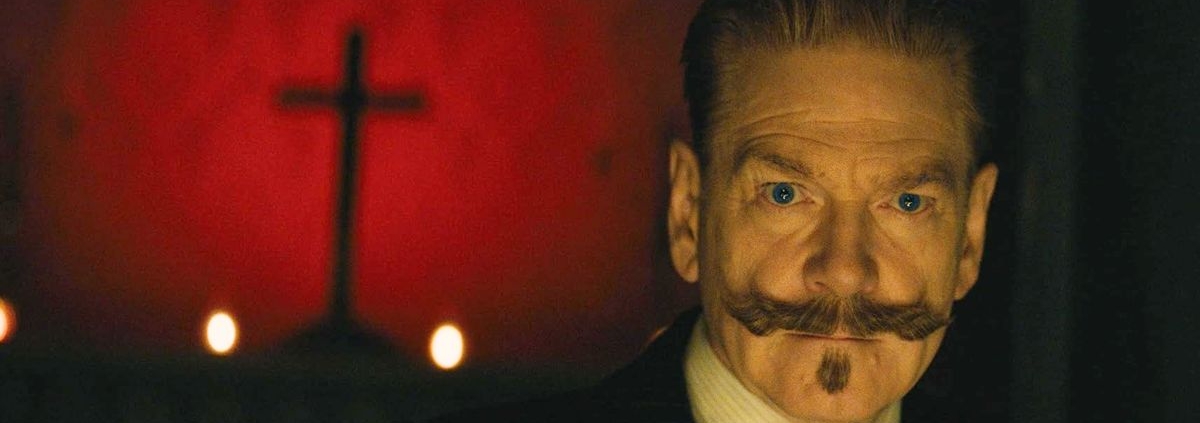‘A Haunting in Venice’ Brings Agatha Christie Classic to the Big Screen
By: Russ Matthews
Acclaimed director, writer, and actor, Kenneth Branagh has had an illustrious career that has him travelling through a season of enjoying one of his favourite personas.
He relishes embodying the Belgian detective Hercule Poirot, created by the legendary novelist Agatha Christie. Yet, in his latest production, Branagh has his alter-ego venturing into the canals of Venice with a reimagined depiction of Christie’s 1969 novel Hallowe’en Party that has never been adapted for the cinema.
After the previous murder mystery on the Nile, Detective Poirot retired from solving cases and settled for life in Venice’s beautifully picturesque Italian city. Until one day, he is compelled to assist an old friend and novelist Ariadne Oliver (Tina Fey), who wants to recruit the Belgian crime-fighter to debunk the works of infamous psychic Joyce Reynolds (Michelle Yeoh). The medium has been hired by the internationally acclaimed opera soprano Rowena Drake (Kelly Reilly) to connect with her recently departed daughter, Alicia (Rowan Robinson). Despite being reluctant to be drawn back into this investigative work, Poirot is intrigued to have the opportunity to discredit someone whom he believes to be a fraud. The festivities all happen during the celebration of Halloween. As with any Agatha Christie-inspired tale, her favourite detective will be forced to search for the answers to a murder that seems to involve supernatural forces.
Familiar With a Fresh Spin
For those who have enjoyed Branagh’s immersion in this investigative character, A Haunting in Venice will provide enough of the familiar to satisfy while adding a fresh spin to this franchise. The moustache, ensemble cast, and murder mystery consistently set the stage. Yet, what is different about this screenplay is how it delves into the spiritual realm as a means of explanation that some could label as horror. This might be a step too far for the story’s definition as this would be better served to be called a spiritually-driven suspense thriller. Reminiscent of Branagh’s earlier world, Dead Again (1991), which involves many of the visual theatrics of well-crafted suspense that weaves in the supernatural realm.
Interestingly, the genre-bending manner is not the main thing that changes the tone of this film. The most significant spin is that the director changes the location and the overall Christie-inspired narrative. Not that it doesn’t have all of the markers of the writer’s style incorporated into the screenplay, but this is not the same tale as the original novel. That allows the originality to begin that should not offend Christie fans while providing unknown twists for anyone coming along. It is a story complemented by a wonderful cast anchored by Branagh and Tina Fey with the unnerving brilliance of young actor Jude Hill (Belfast), who portrays Leopold Ferrier. The ensemble cast all provide their own flare and spice to this production, but the film belongs to Branagh, who does not disappoint.
A Haunting in Venice is meant as a bit of indulgence for fans of the franchise and the film’s creator. For those who yearn to see Hercule Poirot on screen unearthing the mysteries of this world and the supernatural, you are in for a treat.
Reel Dialogue: Is there anything after this life?
Hercule Poirot has moved into an existentially challenging time in his life. After all the horrors he has seen in his career and during his time at war, he has concluded that there cannot be a loving God with all of the pain in this world. Yet, throughout the film, he is confronted with discussions of the supernatural and the value of faith in people’s lives. He moved from a robust atheistic stance to being someone willing to consider the spiritual realm.
It might surprise many, but Christianity is the only worldview that has an actual answer to the problem of evil and suffering. Christians can attest that they serve a God who lived as a man on this earth and experienced temptation, torture, hunger, thirst, hatred, and death. Due to the work of Jesus on the cross, the justice of God is manifested in his son. The cross is a means of symbolising how much God cares about humanity’s suffering. A more profound conclusion is that we may never know the specific reason for our suffering. Still, we can identify the God who understands the rationale behind the pain.
“If only there were someone to arbitrate between us, to lay his hand upon us both, someone to remove God’s rod from me, so that his terror would frighten me no more. Then I would speak up without fear of him, but as it now stands with me, I cannot” – Job 9:33
Article supplied with thanks to City Bible Forum.
All images: Movie publicity
About the author: Russ Matthews is a film critic at City Bible Forum and Reel Dialogue. He has a passion for film and sparking spiritual conversations.











